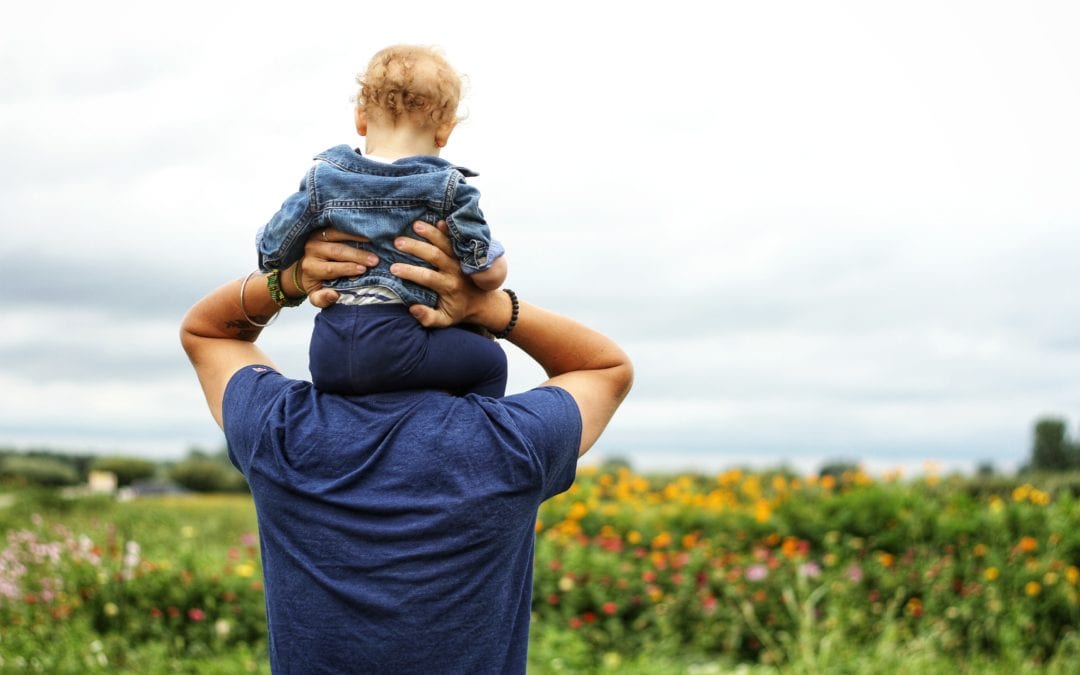Dads with postpartum depression and anxiety is more common than you might think! At Cornerstone Christian Counseling, we’re here for you every step of the way. Here is my story:
I’ll never forget my husband coming home after taking his “Daddy Boot Camp” training, holding my breath, and wondering what he thought. My brother-in-law had taken it when they had children and had highly encouraged him to take it too once we were pregnant, otherwise, I don’t think my husband would have been up for it. He would often tell me things like, “You girls have been preparing for this mom thing all your lives from the time you are given your first baby doll. We men are simply not, we don’t know what we are doing.” So I was beyond relieved when he got home from the class and told me all the great treasures he had learned about parenting and was excited to implement; to this day we still use many of them!
FATHERHOOD: THEN AND NOW
There are a lot of stereotypes that are being challenged in society – Fatherhood is one of those areas. Go back a few generations to what childbirth used to look like, and you would often find men not in the birthing room, but in the waiting room. Then, once the child was born, the Father might be able to take a few days off, a week if lucky. Fortunately, these are no longer the norms of our society. Dads are encouraged in the birth room and engaged throughout the whole process – just ask my husband about that one! He loves telling the story of having to hold one of my legs during the pushing process while he had to go to the bathroom (yes, we all feel so bad for him – haha)! Furthermore, there are now opportunities for Dad’s to take paternity leave of a few weeks, and things like skin-to-skin contact is not just encouraged for the Mom and baby, but for Dad and baby as well. Attachment and bonding are vital not only with Mom, but also with Dad.
Interestingly enough, for all the positive steps taken towards engaging and including a Father during the birth and first few months of life with his child, one misconception that is still largely unaddressed is that a father doesn’t experience the emotional and physical impact that a mother does once the baby is born. This simply isn’t true. With the recent training around Perinatal Mood Disorders that I and several members of the Cornerstone staff completed, one of the most impactful sessions we attended was where we learned that men experience postpartum depression too.
changes…changes…changes…
Following the birth of a child, men are known to experience a decrease in testosterone and increases in cortisol, estrogen, vasopressin and prolactin/oxytocin. Their bodies/systems are having to reset, their sleep cycles are often interrupted/impacted, and their lives are completely being restructured!! I was surprised that our training was the first time I had heard this; even though my husband took the “Daddy Boot Camp” training, this was never brought up.
Signs of dads with postpartum
Being a dad is hard! Some of the key factors to be aware of as a Father, especially if you have young children or newborns, are:
- Understanding a change in roles/schedules will bring additional stress and uncertainties
- One in 10 new dad’s develop depression
- 2-18% new dad’s develop anxiety
- There is a higher impact of a new baby when the dad has a history of mental health issues, abuse, or trauma
The other areas to be aware of as a new Dad are ways that depression can be “masked” with:
- Lower stress threshold
- Substance use
- Aggressiveness, low impulse control
- Feeling of being burned out and empty
- Constant, inexplicable tiredness
- Irritability, restlessness, dissatisfaction
- Difficulty making ordinary everyday decisions
- Sleep problems
- Feeling anxiety –especially in the morning
- Abusive, hyperactive, or antisocial behavior
- Depressive thoughts
- Criticizing
- The “withdrawal response”
- ANGER, ADDICTION, AND WITHDRAWAL
I believe that more and more as a society we are understanding the importance of Fathers being actively involved in their children’s lives and the benefit they bring to the health of the family. Among the many, many values a Father brings into the life of the child, a few note-worthy areas include: fostering a positive relationship with the child’s Mother, spending time with the child, nurturing the child, disciplining appropriately, serving as a guide to the outside world, protecting and providing, and being a role model.
Especially between birth and age 5, studies show that when both parents are actively involved in the parenting of the child, the child has a higher IQ, school readiness, social skills, emotional regulation, and empathy. The child also has increased attachment, emotional security, social acceptance, and independence.
Tips for dads struggling with postpartum
Here are a few helpful suggestions for Dads who want to work on improving their involvement with their child and battle against the signs of depression or anxiety:
- Jump in and help with everything and anything you can with the new baby or children
- Learn as much as you can about the child’s development
- I love Dan Siegel’s books “The Whole Brain Child” and “No Drama Discipline”
- Have weekly or biweekly meetings with mom to “check-in” and see how everyone is doing
- Provide for more than just what’s material….show up and be the best you
- Communicate assertively with mom and ask for the same from her; we know you can’t mind read but sometimes we think you can
- Connect with other dads
- New dads, find your own “Daddy Boot Camp” – they are amazing on so many levels
- Don’t be afraid to ask for help!
And Moms, you can help support Dad, too!
- Give dad “alone time” with child
- Encourage dad to hang out with buddies and get social support guilt-free
- Help them get their own social support needs met
- Recognize that dads’ approach to parenting is different, and not necessarily bad
- Manage your own mental health
With Father’s Day fresh on our minds, we just want to shout it from the rooftops: Dads, you do so much! We thank you and value you for who you are and for all the ways you love your children! We see you too, and you are not alone!
However, it’s not easy being a parent. If you or someone you love is struggling with the adjustment a baby has brought into the family, there is no shame in that! In fact, many of us on the team have been there ourselves. Please give us a call or shoot us an email, and we would be honored to pair you up with a counselor who can walk with you through this transition!
Some additional Resources:
- Padre Cadre – www.padrecadre.com
- Life of Dad – www.lifeofdad.com
- Basic Training for New Dads – www.menexcel.com
- FB Brand New Father Group – https://www.facebook.com/groups/bnfsupport/
- Postpartum Support International – www.postpartum.net **Dads Chat**
- The Good Men Project – http://goodmenproject.com/category/families/
- Daddit – http://www.reddit.com/r/daddit
- Dad Labs – http://www.dadlabs.com/
- National Fatherhood Initiative – www.fatherhood.org
Invitation
We would love to set you up with one of our professional therapists (we have online counseling options). Feel free to explore our website and read through some of our therapist’s bios. Give us a call with your questions at 303-902-3068 or email us at [email protected].


